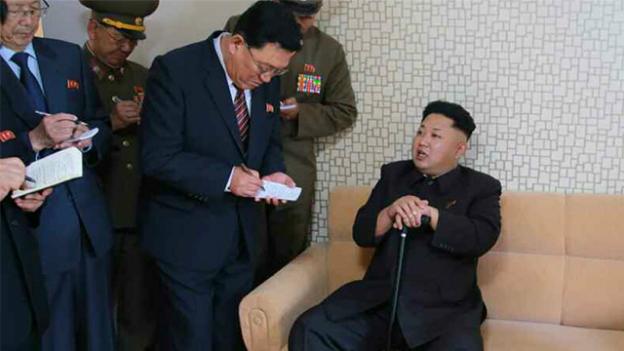South Koreans wage chocolate propaganda war with chocolate pie
- Published
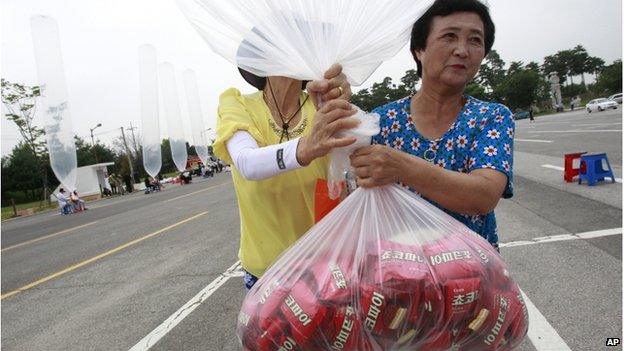
Those sending the balloons to North Korea often include Choco Pie snacks, which are much coveted in the North
Can chocolate biscuits topple communism? Does a humble snack have the political power to push the North Korean regime out of existence?
Activists in South Korea certainly think that a sugary and gooey cookie known as a Choco Pie might help bring about change in the North. That is why defectors from the North send thousands of them attached to balloons back over to the country they left.
And maybe North Korean leader Kim Jong-un fears the power of the chocolate biscuit too. It is not so much the calorific content that is the problem, but the pull the cookies have on his people.
Choco Pies are something of a delicacy in South Korea and prized in the North so much that they've become a form of currency there.
South Korean companies operating in a special industrial area just inside the North decided to give their North Korean workers the cookies as a bonus. Reports from North Korea say that many workers kept them and re-sold them or exchanged them for other goods.
So much do the North Korean authorities dislike the propaganda balloons with their goodies from the South that they have threatened to shell launch sites, and two weeks ago North Korean soldiers fired at the balloons, prompting an exchange of fire when the South returned the shots.
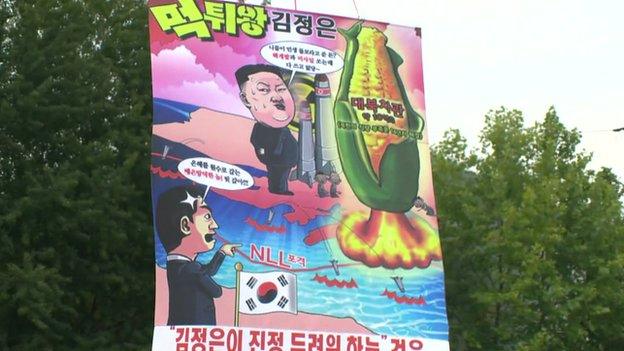
Defectors released a poster saying Kim Jong-un "turns aid into rockets, not food"
Of course, it is not just the Choco Pies which are offensive to the North Korean regime.
The balloons also carry insulting leaflets which depict Kim Jong-un as a cartoonish, overweight despot. They have slogans saying that he has used aid meant for food to build rockets instead.
But it is the goods from the South which may be more effective in toppling the regime.
Prof Andrei Lankov of Kookmin University in Seoul told the BBC that he thought the treats had huge propaganda value: "Choco Pies are actually the best thing to send."
"When North Koreans see high-quality consumer goods produced overseas, they begin to understand that their economic system doesn't really deliver."
"We saw it in Eastern Europe. Communism in Eastern Europe wasn't destroyed by the dream of freedom but by the sight of a Western supermarket. And I don't see why North Korea should be any different".
Prof Lankov is the authority on this subject because he was educated in the Soviet Union and then studied in North Korea before ending up in Seoul.
He thinks leaflets have a minimal effect because they are usually picked up in the North by hardly any people. They are also mistrusted because they come from the source of hostile propaganda.
"Broadcast is better, and digital stuff which can be smuggled in."
"North Korea is a poor country but not as poor as most people imagine, and now many North Koreans have access to computers - there's no internet connection but there are a lot of unconnected computers in the country. So scanning books, entire libraries is a good idea."
South Korean activists launch propaganda balloons over border (2014 video)
He wants the provocative balloons to continue even though he says the effect of the leafleting is minimal.
"Balloons should continue exactly because the North Korean side gets so annoyed. It's quite important not to give in to North Korean political demands because one concession will make another concession unavoidable. "
"Because the North Korean side is so demanding, it makes sense to hold fast, just to show them a bit of firmness, to show them that they are not going to order other people around as they please."
But that is not a universal view in South Korea. There are often counter-protesters at balloon launches. These opponents are not people who approve of the regime in the North.
Rather, they say that: one, provoking a nuclear state is not a safe way of conducting oneself, and two, that the aim is to re-unify Korea and that ultimately means talking to the leadership in Pyongyang.
The counter-demonstrators object to the way the balloon launchers dress, in military style uniforms with wrap-around sunglasses.
As one objector to the balloons put it to the BBC: "The North Korean defectors organise themselves almost like a military. You see the uniforms and hats and boots, and sending those leaflets saying that the North Korean leaders are evil people."
But aren't they evil? "I don't want to make a value judgement about that", replied the anti-balloon protester.
"If you want peace, you should respect each other with the ultimate goal of peace-making. If you want to start a war, then you can criticise North Korean leaders in a bad manner."
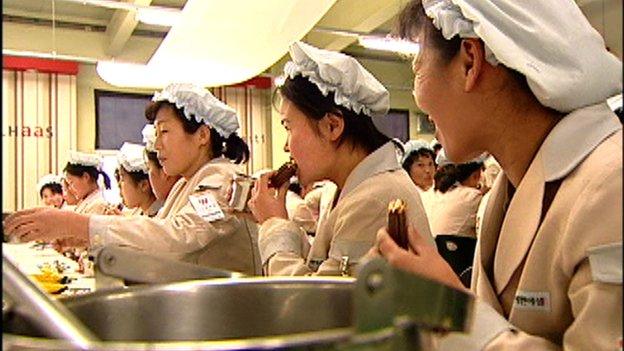
Choco Pies are said to be prized in the North and have become a form of currency
This debate is reminiscent of the debate which took place in the West before communism in Europe collapsed.
The argument then was between those who thought "standing up to Russia" was the way to win and those who wanted concessions via what became known in Germany as Ostpolitik.
There are parallels between the Korean situation and the German situation: they are both divided peoples keen to be reunited, keen for families to be reunited.
In Germany, there were also balloons carrying goods sent over the wall - they were called "mauerseglers" (wall sailors).
Many Germans believe that what brought down communism in East Germany was the pervasiveness of West German television on the other side of the wall - East Germans could see the living standards of the West every night on a screen in their living rooms.
Ideology and vague notions of freedom may be less powerful than the ultra-sweet, ultra-gooey Choco Pie.
- Published10 October 2014
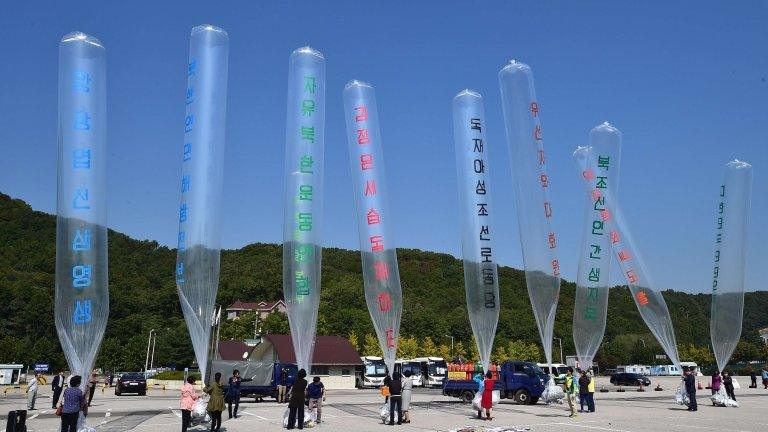
- Published10 October 2014
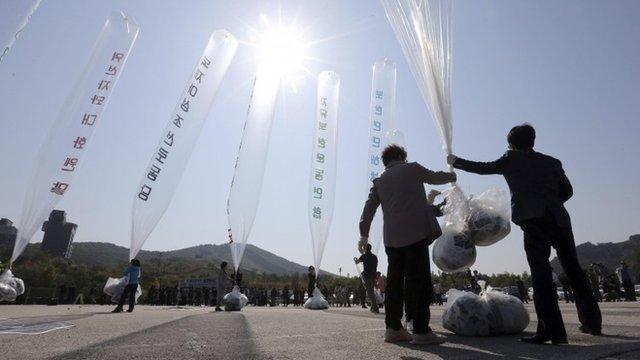
- Published22 October 2014
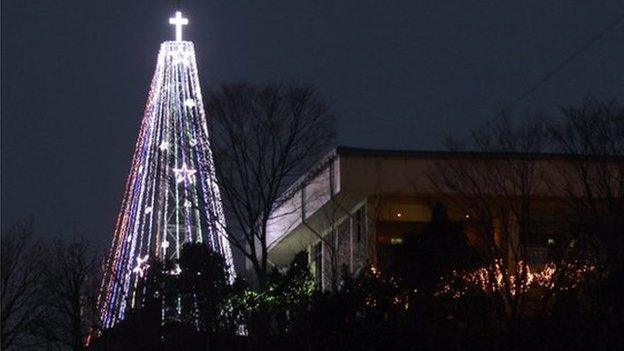
- Published26 April 2019
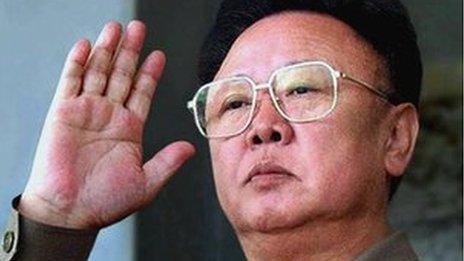
- Published14 October 2014
